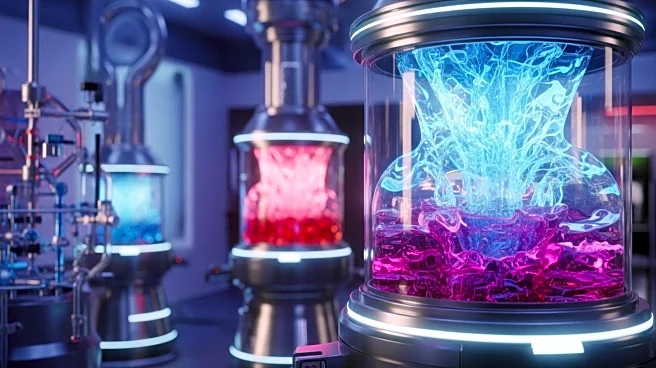What's Happening?
Recent advancements in biotechnology have led to the development of lab-grown products, including meat, dairy, and even diamonds. These innovations are made possible through techniques such as cell cultivation and 3D bioprinting. For instance, consumers can now enjoy steaks grown from cow cells without the need for traditional farming, and cheese made from whey protein produced by microbes. Additionally, lab-grown diamonds, which possess the same properties as natural diamonds, are becoming increasingly popular. This shift towards lab-grown products is part of a broader trend of integrating lab-created materials into everyday life, including medical applications like 3D-printed skin grafts.
Why It's Important?
The rise of lab-grown products has significant implications for various sectors, including agriculture, healthcare, and luxury goods. In agriculture, lab-grown meat and dairy could reduce the environmental impact of traditional farming, offering a sustainable alternative to meet growing food demands. In healthcare, bioprinting technologies provide new solutions for medical treatments, such as custom skin grafts, potentially improving patient outcomes. The jewelry industry is also seeing a shift, with lab-grown diamonds offering a conflict-free and environmentally friendly option. These developments could lead to economic shifts, with industries needing to adapt to new production methods and consumer preferences.
What's Next?
As lab-grown products become more mainstream, regulatory frameworks will need to evolve to ensure safety and quality standards. Consumer acceptance will play a crucial role in the adoption of these technologies, with education and transparency being key to overcoming skepticism. Industries may also face challenges in scaling production and reducing costs to make lab-grown products competitive with traditional options. Continued research and innovation will be essential to address these challenges and fully realize the potential benefits of lab-grown technologies.
Beyond the Headlines
The ethical implications of lab-grown products are significant, as they challenge traditional notions of natural versus artificial. This raises questions about consumer perceptions and the value placed on authenticity. Additionally, the shift towards lab-grown products could lead to cultural changes, as societies adapt to new ways of producing and consuming goods. The long-term impact on employment in traditional industries, such as farming and mining, will also need to be considered, as these sectors may face disruption from technological advancements.









